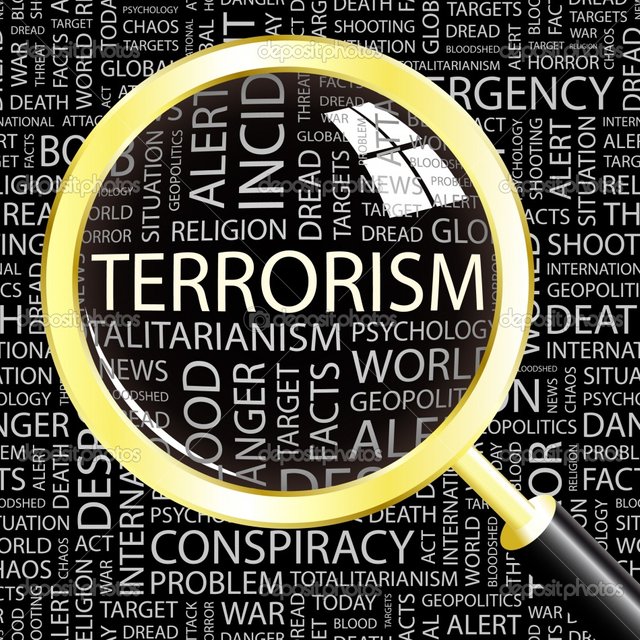
You may be saying that you know what terrorism really is, but do you?
The FBI defines terrorism into three different classifications: international terrorism, domestic terrorism, and federal crime of terrorism.
Pulled from the FBI's website...
International terrorism means activities with the following three characteristics:
• Involve violent acts or acts dangerous to human life that violate federal or state law;
• Appear to be intended (i) to intimidate or coerce a civilian population; (ii) to influence the policy of a government by intimidation or coercion; or (iii) to affect the conduct of a government by mass destruction, assassination, or kidnapping; and
• Occur primarily outside the territorial jurisdiction of the U.S., or transcend national boundaries in terms of the means by which they are accomplished, the persons they appear intended to intimidate or coerce, or the locale in which their perpetrators operate or seek asylum.*
* FISA defines "international terrorism" in a nearly identical way, replacing "primarily" outside the U.S. with "totally" outside the U.S. 50 U.S.C. § 1801(c).
Domestic terrorism means activities with the following three characteristics:
• Involve acts dangerous to human life that violate federal or state law;
• Appear intended (i) to intimidate or coerce a civilian population; (ii) to influence the policy of a government by intimidation or coercion; or (iii) to affect the conduct of a government by mass destruction, assassination. or kidnapping; and
• Occur primarily within the territorial jurisdiction of the U.S.
Federal crime of terrorism is an offense that:
• Is calculated to influence or affect the conduct of government by intimidation or coercion, or to retaliate against government conduct; and
• Is a violation of one of several listed statutes, including § 930(c) (relating to killing or attempted killing during an attack on a federal facility with a dangerous weapon); and § 1114 (relating to killing or attempted killing of officers and employees of the U.S.).

This is how the government defines terrorism. Many would agree with this assessment and when discussing terrorism this is what they mean. Remember that because semantics is important when debating others. Let’s discuss domestic terrorism. You can be considered a domestic terrorist if you commit an act that is considered “dangerous” to human life that violates federal or state law, “appear” intended to influence the policy of government by intimidation or coercion, and be within the U.S.
First, who defines dangerous? Merriam-Webster defines dangerous as “involving possible injury, harm, or death : characterized by danger”. However, if we look at the root definition of dangerous it is defined, when used in context of an individual, as someone who is “difficult, arrogant, severe”.
The federal and state governments create roughly 400 to 650 new/changes in laws and regulations every biennium that you must abide by regardless of your location in the U.S. These changes mean you have new and interesting ways to violate federal and state law. Did you know you probably break the law daily?
Next, someone must appear, “have an outward aspect”, that they intend to influence the policy of a government by intimidation or coercion. This is purely subjective in nature. They do not need physical proof or objective evidence, only that you appear so to police or a government agent. Is protesting a form of intimidation?
Lastly, all of this needs to occur within the U.S. territories. How many activists fit this criteria?
Is this what you thought terrorism was defined as?
Terrorism was initially coined in 1790s as a term to describe a “government intimidation during the Reign of Terror in France” and came from the word terror. Terror comes from the Latin word terrorem, “great fear, dread, alarm, panic; object of fear, cause of alarm; terrible news”. The first time the word terror was used was to describe the French government’s actions against its own populace during the Reign of Terror.
Now we have definitions that say an individual’s actions, or appear to act, against its government can be terrorism - not the other way around. Do you think you are free and not being controlled? Do you think we should be using terms correctly? Tell me your thoughts below.
My name is Jeffrey Hann and I'm an anarchist/voluntarist, Army veteran, business analyst, graphics and website designer, and content creator. I have a passion for truth and being logical, which eventually lead me to anarchism. I strive to live my life through voluntary actions and valuing rights. I own Journalistic Revolution (Facebook) and I can be found on Twitter|Instagram|Minds|Steemit|Keybase
If you enjoy my work please think about donating crypto:
- BTC address - 12TLd1xnRXSQZnVfMG8WRUNNF9k4YoKDsc
- ETH address - 0x589BA5535D507999c1413871390554225ae775F6


